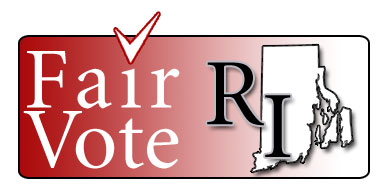Submitted by Ari Savitzky, FairVote RI Director
Allowing voters to pre-register to vote at 16 is a common sense, non-partisan policy, with broad and ever growing support in Rhode Island.
* Crunching the Numbers: The Registration Gap, and the Voting Habit
Young people vote when they’re registered, but they tend to be registered at much lower rates than average. Take the 2004 election: 81% of registered 18-24 year olds voted, compared to a national rate of about 86%. The “key difference” according to the US Census Bureau, in lower overall turnout was that group’s dramatically lower registration rates.
There is, then, not so much a participation gap as a registration gap. State data bears out a similar tale. In 2004, about 60% of registered 18-25 year olds voted in Rhode Island, compared to about 70% all registered voters. But, a rough calculation from census data and the RI voter list reveals that perhaps as few as 40% of eligible Rhode Island 18-25 year olds were registered to vote in the 2004 election, well below the average for all eligible Rhode Island voters. Youth Voter Pre-registration addresses the registration gap by creating clearer, simpler registration opportunities for soon-to-be voters.
Electoral analyses and academic studies have also shown that past participation is a major factor in determining future participation. Starting that habit early is crucial. In a 2003 study, researchers showed that participation in the previous election increased the probability of voting in the next one by up to 47%, as much as can other well-known factors like education and income, and parental voting behavior. Professor Eric Plutzer, who conducted one such study, told the journal Research Penn State that:
Convince a young citizen to vote, and he or she will read the newspaper differently, recognize the names of people on the ballot when they're mentioned on television or by a neighbor, and eventually become highly informed. Get them to the polls once, and they will likely vote again and again."
* The Best Practices Dilemma
When it comes to youth engagement, state law identifies the points of civic engagement where voter education and registration opportunities are most effective – in high schools, and civics classes, at the DMV or in driver’s ed – but we only make voter registration available to a non-uniform slice of students, new drivers and young people.
Rhode Island’s lack of a uniform voter registration age makes it harder to run effective voter registration and education programs. Because the age to register is constantly shifting based on proximity to the next election, we confuse potential facilitators, and miss a broad swath of young people. More than that, we miss crucial opportunities to tie voter education and voter registration. A uniform registration age of 16 makes high school registration drives easier for students and administrators, catches all young people at the DMV, and greatly boosts the effectiveness of civics education by tying it directly to civic participation through the opportunity to pre-register.
It would also make the system as a whole simpler, and make registration for young people more systematic, encouraging them to register in structured environments like schools and the DMV. According to the Census Bureau’s 2004 Current Population Survey, over 40% of young people registered at the DMV or in school.
* Implementation
Pre-registration could be implemented easily. It would require small changes to the voter registration form, and to the central voter registry software, both of which the State Elections division has indicated they can do without risk.
Pre-registration could also help Rhode Island clean its voting list, by cutting down on human error. Young voters would be much more likely to pre-register at the DMV, using the computer form, or type in their info online and print it. They would also be more likely to register at points of civic engagement like a classroom or driver’s education course, where they could ask questions. Pre-registration is a cost-effective step toward greater standardization, which means a cleaner, more accurate data set. Pre-registration could also save money and minimize human error by allowing students to register year round at points of civic engagement and education, helping order the chaos of private, partisan voter registration, which can swamp boards of canvassers in the run-up to the voter registration deadline.
* Other States
Hawaii, Florida, and Puerto Rico allow 16 year olds to pre-register to vote. Several other states, like Oregon and Maine, allow early registration for 17 year olds. This reform has already passed one house in the Maryland legislature this year, and is being considered by legislators and policymakers in California, Minnesota and Michigan. Even more importantly, this legislation has been passed by both Houses of the Rhode Island General Assembly twice, in 2006 and 2007. Last year the Senate passed it by a margin of 29-3.
Now, in 2008, Rhode Island has a chance to be a leader in passing this important youth engagement measure, and ensuring a vibrant future for Rhode Island’s democracy.

